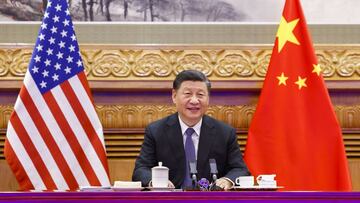What aid has Russia requested from China since the invasion began?
President Biden and Chinese leader Xi Jinping spoke today about the situation in Ukraine. Has Russia asked China for support in its military invasion?


Before the Russian invasion of Ukraine, the Russian Federation and People's Republic of China had taken various steps to affirm the deep relationship between the two countries. Just before the invasion began, Chinese leader Xi Jinping invited President Vladimir Putin to attend the opening ceremony of the Winter Olympic Games in Beijing as his guest of honor.
More:
Putin had accepted the invitation after the United States had announced that it would be conducting a diplomatic boycott of the games. This decision was made by US officials in light of China's track record of violating human rights, including the treatment of ethnic minorities like the Uyghurs.
In early February the Russia and China released a statement affirming that the relationship had "no limit," hinting that in the case Russia did invade Ukraine, China would back fill the country economically.
Before the invasion began, the US was working to develop an economic sanctions package in the case Russia escalated to a military conflict. The move by China to back-fill was a serious threat to the severity of the package. To dissuade China from taking this path, the US made it clear that any back filling on the part of the Chinese would be met with its own set of economic consequences. However, this could have negative impacts on its own economy considering how highly dependent the US is on Chinese goods. Around eighteen percent of US imports come from China and if this trade relationship was impacted, US customers would be sure to pay a high price.
Has Russia asked China for support in Ukraine?
The White House has stated in recent days that Russia has requested military assistance from China. President Biden and his administration have been quick to warn China that if they were to begin providing military assistance, they would face severe economic consequences.
On 14 March Foreign Ministry Spokesperson Zhao Lijian said that China had been the target of a "maliciously spreading disinformation," by the US on their position over the invasion of Ukraine. Lijian described China's position as "consistent and clear."
"We have been playing a constructive part in promoting peace talks," said Lijian.
On March 18, responding to a question from the media asking if the government felt their response to the Ukraine invasion was getting "awkward," Lijian responded by pointing blame at the US; although never mentioning the US or its allies directly. China sees the reaction from the US as dangerous and Chinese leaders disagree with the sending of weapons to Ukraine.
How did China respond to the invasion of Ukraine?
One of the first calls made to an international leader after President Putin decided to invade Ukraine was to Xi Jinping. China's Ministry of Foreign Affairs reported on 25 February that Putin had "set forth the historical context of the Ukrainian issue, Russia's special military operation in eastern Ukraine and its position." The statement threw blame at the feet of the US and NATO, who according to Putin had "turned a blind eye to Russia’s legitimate security concerns, and have repeatedly negated their promises to Russia."
On 18 March, President Biden and Chinese leader Jinping met to discuss various topics including the invasion of Ukraine. The White House stated that China had not verbalized a new position on the issue and that the country is still developing a response.
#China Foreign Ministry release on Xi-Biden call. (State media had already started posting, a more recent practice by Chinese side to get ahead of Americans and shape the narrative about US-China talks.) @POTUS pic.twitter.com/ZSpFXWD47o
— Eunice Yoon (@onlyyoontv) March 18, 2022
"President Biden made clear the implication and consequences of China providing material support — if China were to provide material support — to Russia as it prosecutes its brutal war in Ukraine, not just for China’s relationship with the United States but for the wider world," said a Senior White House Officials after the call.
Related stories
In the days leading up to the call between the two leaders, Lijian had affirmed China's commitment to the UN Charter saying that the country "has long held the basic position of respecting all countries’ sovereignty and territorial integrity." This comes as China is calling on the US to commit itself to defending the "One China" policy which is a precondition of diplomatic relations with China. The "One China" policy relates to China's geographical boundaries which include Taiwan.
During the call, Xi Jinping did bring up the Taiwan, with President Biden responding that the position of the US had remained unchanged. The US had vowed to protect Taiwan's territorial integrity while still remaining "committed to our one-China policy and is guided by the Taiwan Relations Act, the Three Joint Communiqués, and the Six Assurances." Both leaders also "underscored the importance of maintaining peace and stability across the Taiwan Strait."
After Xi Jinping's call with Biden, Chinese state media published articles saying China will "never accept coercion" from US, blamed US for the war in Ukraine, continued to ask for investigations of US bioweapons in Ukraine & made a video to glorify Putin & belittle sanctions. pic.twitter.com/taA0wQXxqq
— Roy Ngerng 鄞義林 (@royngerng) March 19, 2022

